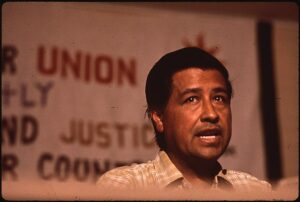Sí se puede. Yes, we can: Celebrating César Chávez Day
Today on César Chávez Day, the Cornell Small Farms Program honors Chávez, a leader of multiethnic, multilingual organizing efforts for dignity among agricultural laborers in the United States.
We are committed to lifting up the stories of those who work the land and whose struggles for respect in life in agriculture have established a legal and ethical foundation for the work we do.

César Chávez, leader of United Farm Workers of America, 1972. Photo: Cornelius M. Keyes. Public Domain.
Chávez (1927-1993), a manual laborer and veteran of the U.S. Navy, was a first-generation American born in Arizona to parents of Mexican origin. His family lost their home and business during the Great Depression and he was obligated to join the ranks of itinerant farmworkers in California.
In the 1960s, Chávez’s organizing efforts with the National Farm Workers Association (NFWA), an organization he founded with Dolores Huerta, brought to light inhumane and dangerous working conditions for immigrant agricultural workers. NFWA joined with Filipino agricultural workers to establish the United Farm Workers of America (UFW) during a strike and five-year boycott of grapes in and around Delano, California.
The boycott ended in 1970 when growers agreed to a contract with the UFW. This agreement set a precedent for recognizing agricultural workers as part of the labor movement, even while they did not enjoy the same rights afforded to workers in other sectors.
Though Chávez’s formal education ended in eighth grade, his commitment to learning was ongoing, and education was central to his approach to achieving human rights. He studied the example of Gandhi and incorporated the Catholic church’s social teachings into his work. He led nonviolent marches, developed mutual aid programs including a credit union and affordable housing, and endured weeks-long fasts to highlight the conditions of his compatriots in the fields. He led the UFW to participate in broader efforts for social change, including Rev. Dr. Martin Luther King, Jr.’s Poor People’s Campaign.
March 31, César Chávez’s birthday, was declared a national holiday in 2014. California observes the date by closing state offices and schools, and encouraging community service. Several other states make closings optional.
At the Small Farms Program, we participate today in honoring the legacy of César Chávez’s to recognize the worth, contributions and dignity of all who have a role in putting food on our tables, including Migrant Justice / Justicia Migrante in Vermont, the Coalition of Immokalee Workers in Florida, Familias Unidas por la Justicia in Washington, Alianza Agrícola in New York State, and all of the farmers and farm employees who grow and distribute food around the country.
Whether they are farm owners, managers, supervisors, farm employees or aspiring farmers, everyone has a right to a decent standard of living, dignified living and working conditions, as well as technical and financial support and education in their language of choice. All of this, and the right to pursue their goals and dreams with the institutional support of universities and the state.
Our Futuro en Ag project is a growing educational initiative that prepares Spanish-speaking New Yorkers for success in the leadership of farm operations. We take strength in learning and sharing the histories of people from all walks of life on whose shoulders we stand, who have set out to make the world more equitable for those whom society makes invisible.
Sí se puede. Yes, we can.

